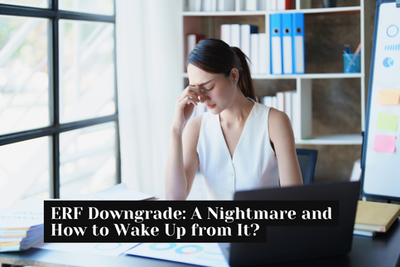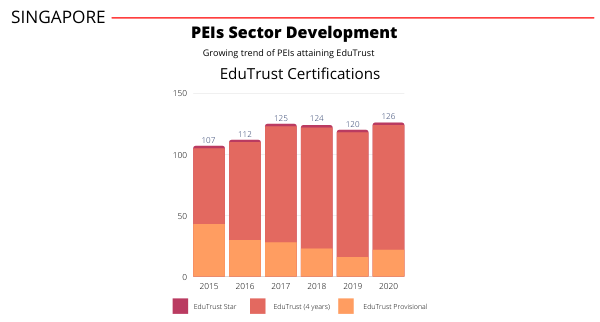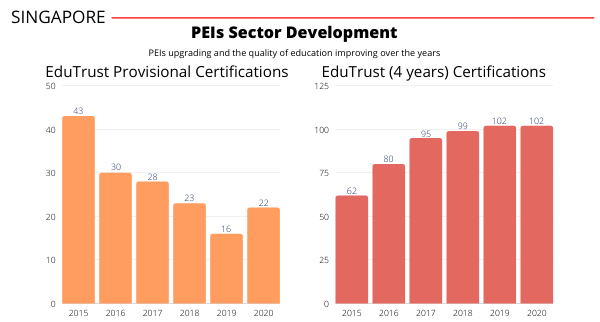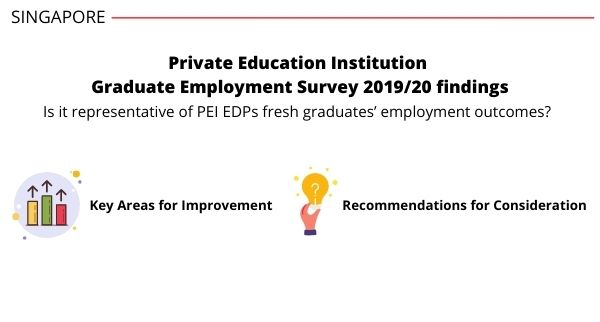Understanding ERF Downgrade
The Enhanced Registration Framework (ERF) is a regulatory framework established by the Committee for Private Education (CPE) to ensure that Private Education Institutions (PEIs) in Singapore adhere to basic standards of quality in administration, student welfare, and academic
processes.
A downgrade in ERF status usually signifies non-compliance with the stringent standards set by the CPE, which can lead to increased scrutiny from regulatory bodies and a loss of confidence among students and parents. Institutions with downgraded ERF status face diminished credibility,
loss of student trust, and potential financial instability. Hence, it is crucial for PEIs to understand the gravity of maintaining their ERF status and to implement strategies that prevent downgrades.
How to Prevent ERF Downgrades?
In Singapore’s competitive private education sector, maintaining the ERF status is vital for PEIs. It involves a multifaceted approach to ensure continuous compliance with the standards set the CPE. Here are key strategies to prevent losing or downgrading ERF status:
1.) Strict Adherence to CPE Standards
PEIs must regularly review and integrate the latest CPE regulations into their daily operations. Conduct regular internal audits and compliance checks can help to identify and address any deviations promptly, thus ensuring adherence to CPE standards.
2.) Timely Renewals
Proactive management of renewal processes ensures that all required documents are prepared and submitted in a timely manner, avoiding last-minute rushes that could lead to errors or omissions. This can help in maintaining uninterrupted ERF status and demonstrates the institution’s commitment to compliance.
3.) Independent Compliance Department
To prevent ERF downgrades, PEIs can also consider establishing an independent compliance function. By separating compliance duties from other administrative responsibilities, PEIs can ensure a focused and dedicated approach on regulatory matters. By having a team of experienced professionals oversee adherence to CPE standards, PEIs can ensure that regular audits are conducted objectively, and any issues are promptly addressed. This proactive approach minimizes the risk of non-compliance and helps maintain continuous adherence to regulatory requirements, safeguarding the institution’s ERF status.
How to Upgrade and Maintain the ERF status?
1.) Exceed Basic ERF Requirements
PEIs should strive to exceed the minimum standards set by the CPE. This involves adopting best practices in all operational areas and demonstrating a commitment to excellence.
2.) Continuous
Improvement
PEIs should regularly review and refine their processes based on feedback, industry developments, and regulatory changes. This allows PEIs to remain adaptive and proactive in meeting the regulatory standards.
3.) Aligning with EduTrust Standards
PEIs can consider pursuing for EduTrust certification, which often surpasses ERF standards. This optional certification not only helps in recruiting international students but also elevates the institution’s quality benchmark.
The Intricacies of ERF
ERF compliance can seem complex, but PEIs can effectively manage these challenges with professional guidance. As premier consultancy specializing in ERF and EduTrust certifications, EduValue offers unmatched expertise and support tailored to your institution’s needs. This includes providing independent compliance teams that can be “in-source” to our clients. EduValue’s expertise ensures that PEIs not only meet but exceed regulatory standards, thereby enhancing their educational quality and reputation.
Written By, EduValue Industry Research Team.





